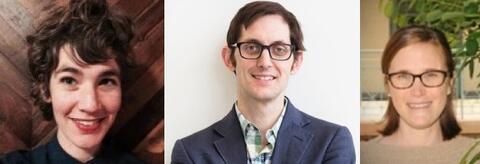
Prof. Amanda Jo Goldstein (U.C. Berkeley) specializes in Enlightenment and Romantic literature and science, with particular interests in rhetoric and poetics, pre-Darwinian biology, and materialist theories of history, poetry, and nature. Her first book, Sweet Science: Romantic Materialism and the New Logics of Life (University of Chicago Press, 2017), shows how writers from William Blake to Goethe, Percy Shelley and the young Karl Marx revived ancient atomist science to argue for poetry as a privileged technique of empirical inquiry, especially when it came to representing the new problem of biological life in its dependency upon broader social and natural histories. The book has been awarded the Kenshur Prize for an outstanding monograph of interest to eighteenth-century scholars. A new research project takes up the ecology of utopia in the early socialist projects dubbed “Romantic” and “Utopian”; another seeks the poetic and scientific roots of the “new” concepts of biosemiosis and plasticity in the long history of epigenetic neuroscience.
Before joining the Berkeley faculty this year, she worked as an assistant professor of English at Cornell University (2012-17) and a postdoctoral fellow in Biopolitics at the University of Wisconsin-Madison (2011-12). She received her Ph.D. in Comparative Literature (English, German, French) from U.C. Berkeley in 2011.
Prof. Joseph Drury (Villanova) teaches courses on Restoration, eighteenth-century, and Romantic British literature. He has a particular interest in the history and theory of the novel, gothic literature, the history of science, medicine, and technology and its intersections with literary culture, material culture, and the history of sexuality. His book, Novel Machines: Technology and Narrative Form in Enlightenment Britain (Oxford UP, 2017), shows how eighteenth-century authors adapted the form of the novel to address the moral, social, and medical concerns raised by the new prominence of machines in Britain’s Industrial Enlightenment.
Courtney Weiss Smith is an Associate Professor in the Department of English and Affiliated Faculty in the Science in Society Program at Wesleyan University. Her research and teaching focus on the literary, cultural, and intellectual history of England in the long eighteenth century. Her book, Empiricist Devotions: Science, Religion, and Poetry in Early Eighteenth-Century England (University of Virginia Press, 2016), is the winner of the Walker Cowen Memorial Prize for outstanding scholarship in eighteenth-century studies. Currently, she is working on an intellectual history of poetic sound (including rhyme, onomatopoeia, and echo).